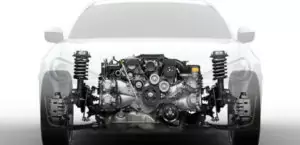The 2.2-liter Hyundai D4HF or Genesis 2.2 CRDi engine has been produced by the company since 2020 and is currently only installed on two Genesis models: the GV70 crossover and the G80 executive sedan. This diesel unit is a modification of the D4HE engine for rear-wheel drive cars.
The R family also includes diesels: D4HA, D4HB, D4HC, D4HD and D4HE.
The engine was installed on:
- Genesis GV70 1 (JK1) since 2020;
- Genesis G80 2 (RG3) since 2020.
Specifications
| Production years | since 2020 |
| Displacement, cc | 2151 |
| Fuel system | Common Rail |
| Power output, hp | 210 |
| Torque output, Nm | 441 |
| Cylinder block | aluminum R4 |
| Block head | aluminum 16v |
| Cylinder bore, mm | 83 |
| Piston stroke, mm | 99.4 |
| Compression ratio | 16.0 |
| Features | intercooler |
| Hydraulic lifters | yes |
| Timing drive | belt |
| Phase regulator | no |
| Turbocharging | e-VGT |
| Recommended engine oil | 5W-30 |
| Engine oil capacity, liter | 5.6 |
| Fuel type | diesel |
| Euro standards | EURO 5/6 |
| Fuel consumption, L/100 km (for Genesis GV70 2021) — city — highway — combined |
8.9 6.8 7.9 |
| Engine lifespan, km | ~330 000 |
| Weight, kg | 197.1 |
Disadvantages of the Hyundai D4HF engine
- This diesel appeared recently and there are no statistics of its breakdowns.
- Instead of capricious piezo injectors, simpler electromagnetic ones are installed here.
- Timing chains have given way to a belt and, according to the regulations, check and inspect every 120,000 km.
- It is not known how the new aluminum block will perform during long-term operation.
- Quite typical problems with the particulate filter or the EGR valve are also expected.






